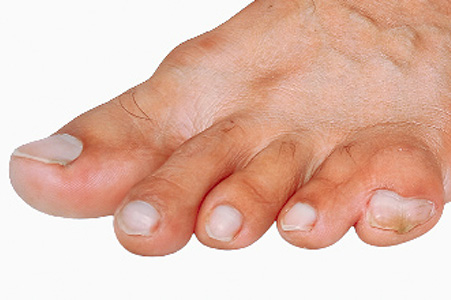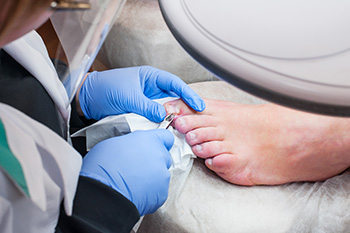
Webbed toes, medically known as syndactyly, occur when two or more toes are fused together by skin, soft tissue, or bone. This condition develops during fetal growth when the toes fail to separate completely. It is a congenital trait, meaning it is present at birth and can run in families. Genetic factors play a significant role, though environmental influences during pregnancy may also contribute. Webbed toes are usually harmless and do not affect function, but in some cases, they may be associated with certain genetic syndromes. The degree of fusion varies, with some cases involving only skin while others include deeper connective tissues. If webbed toes cause discomfort or affect mobility, surgical separation may be an option. If you or your child have webbed toes that are causing any pain or difficulty in completing daily tasks, it is suggested that you consult a podiatrist for treatment options.
Congenital foot problems require immediate attention to avoid future complications. If you have any concerns, contact the foot specialists of Table Mountain Foot and Ankle. Our doctors can provide the care you need to keep you pain-free and on your feet.
Congenital foot problems are deformities affecting the feet, toes, and/or ankles that children are born with. Some of these conditions have a genetic cause while others just happen. Some specific foot ailments that children may be born with include clubfeet, polydactyly/macrodactyly, and cleft foot. There are several other foot anomalies that can occur congenitally. What all of these conditions have in common is that a child may experience difficulty walking or performing everyday activities, as well as trouble finding footwear that fits their foot deformity. Some of these conditions are more serious than others. Consulting with a podiatrist as early as possible will help in properly diagnosing a child’s foot condition while getting the necessary treatment underway.
What are Causes of Congenital Foot Problem?
A congenital foot problem is one that happens to a child at birth. These conditions can be caused by a genetic predisposition, developmental or positional abnormalities during gestation, or with no known cause.
What are Symptoms of Congenital Foot Problems?
Symptoms vary by the congenital condition. Symptoms may consist of the following:
- Clubfoot, where tendons are shortened, bones are shaped differently, and the Achilles tendon is tight, causing the foot to point in and down. It is also possible for the soles of the feet to face each other.
- Polydactyly, which usually consists of a nubbin or small lump of tissue without a bone, a toe that is partially formed but has no joints, or an extra toe.
- Vertical talus, where the talus bone forms in the wrong position causing other bones in the foot to line up improperly, the front of the foot to point up, and the bottom of the foot to stiffen, with no arch, and to curve out.
- Tarsal coalition, when there is an abnormal connection of two or more bones in the foot leading to severe, rigid flatfoot.
- Cleft foot, where there are missing toes, a V-shaped cleft, and other anatomical differences.
- Macrodactyly, when the toes are abnormally large due to overgrowth of the underlying bone or soft tissue.
Treatment and Prevention
While there is nothing one can do to prevent congenital foot problems, raising awareness and receiving neonatal screenings are important. Early detection by taking your child to a podiatrist leads to the best outcome possible.
If you have any questions please feel free to contact our office located in Wheat Ridge, CO . We offer the newest diagnostic tools and technology to treat your foot and ankle needs.

Foot wounds can be complex, especially when they do not heal as expected. That is where the concept of the reconstructive ladder comes in. It is a step-by-step approach podiatrists use to manage wounds, starting with the simplest solutions and advancing to more complex techniques, if needed. The goal is to restore both function and appearance. Treatment might begin with basic wound care like dressings and pressure relief. If healing stalls, techniques like skin grafts or flap surgery may be considered. Each rung on the ladder represents a thoughtful decision to ensure the wound heals properly while preserving mobility. Whether the wound is from diabetes, injury, or another condition, early intervention makes a big difference. If you have a foot wound that is not improving, it is suggested that you see a podiatrist for a proper diagnosis and treatment.
Wound care is an important part in dealing with diabetes. If you have diabetes and a foot wound or would like more information about wound care for diabetics, consult with the foot specialists from Table Mountain Foot and Ankle. Our doctors will assess your condition and provide you with quality foot and ankle treatment.
What Is Wound Care?
Wound care is the practice of taking proper care of a wound. This can range from the smallest to the largest of wounds. While everyone can benefit from proper wound care, it is much more important for diabetics. Diabetics often suffer from poor blood circulation which causes wounds to heal much slower than they would in a non-diabetic.
What Is the Importance of Wound Care?
While it may not seem apparent with small ulcers on the foot, for diabetics, any size ulcer can become infected. Diabetics often also suffer from neuropathy, or nerve loss. This means they might not even feel when they have an ulcer on their foot. If the wound becomes severely infected, amputation may be necessary. Therefore, it is of the upmost importance to properly care for any and all foot wounds.
How to Care for Wounds
The best way to care for foot wounds is to prevent them. For diabetics, this means daily inspections of the feet for any signs of abnormalities or ulcers. It is also recommended to see a podiatrist several times a year for a foot inspection. If you do have an ulcer, run the wound under water to clear dirt from the wound; then apply antibiotic ointment to the wound and cover with a bandage. Bandages should be changed daily and keeping pressure off the wound is smart. It is advised to see a podiatrist, who can keep an eye on it.
If you have any questions, please feel free to contact our office located in Wheat Ridge, CO . We offer the newest diagnostic and treatment technologies for all your foot care needs.

Wearing the wrong running shoes can lead to several issues that affect comfort, performance, and overall foot health. Poor performance is a common sign, as improper support or fit can cause discomfort and inefficiency while running. Runners may experience fatigue more quickly and struggle with maintaining proper form. Premature wear and tear on the shoes can also indicate a poor match, as excessive breakdown of the sole or cushioning suggests inadequate shock absorption or improper foot alignment. Injury is another major concern, as wearing ill-fitting shoes can contribute to blisters, shin splints, knee pain, or even stress fractures. Persistent discomfort, muscle soreness, and joint pain may develop over time. If you have developed foot conditions from wearing the wrong type of running shoe, it is suggested that you visit a podiatrist who can treat various foot ailments, and guide you on what type of shoes to buy for your desired style of running.
If you are a runner, wearing the right running shoe is essential. For more information, contact the foot specialists from Table Mountain Foot and Ankle. Our doctors can provide the care you need to keep you pain-free and on your feet.
Choosing the Right Running Shoe for Your Foot Type
To increase performance and avoid the risk of injury, it is important to choose the right running shoe based on your foot type. The general design of running shoes revolves around pronation, which is how the ankle rolls from outside to inside when the foot strikes the ground.
- Neutral runners are able to choose from a wide variety of shoes, including minimalist shoes or even going barefoot.
- Runners who overpronate, or experience an over-abundance of ankle rolling, should choose shoes that provide extra motion control and stability.
- Runners who underpronate, or supinate, have feet that have high arches and lack flexibility, preventing shock absorption. They require shoes with more flexibility and cushion.
If you have any questions please feel free to contact our office located in Wheat Ridge, CO . We offer the newest diagnostic and treatment technologies for all your foot and ankle needs.

Ingrown toenail surgery is a procedure performed to relieve pain and prevent infection caused by a toenail growing into the surrounding skin. The procedure involves numbing the toe with a local anesthetic before carefully removing the affected portion of the nail. In some cases, the nail matrix is treated to prevent regrowth in the problematic area. Surgery is recommended when conservative treatments fail or when there is recurring pain, swelling, or infection. Common reasons for this condition include improper nail trimming, wearing tight footwear, and genetic predisposition. The benefits of surgery include long-term relief from pain, reduced risk of infection, and improved nail appearance. Healing typically occurs within a few weeks with proper care. If you have an ingrown toenail, it is suggested that you consult a podiatrist who can determine if this type of foot surgery is right for you.
Foot surgery is sometimes necessary to treat a foot ailment. To learn more, contact the foot specialists of Table Mountain Foot and Ankle. Our doctors will assist you with all of your foot and ankle needs.
When Is Surgery Necessary?
Foot and ankle surgery is generally reserved for cases in which less invasive, conservative procedures have failed to alleviate the problem. Some of the cases in which surgery may be necessary include:
- Removing foot deformities like bunions and bone spurs
- Severe arthritis that has caused bone issues
- Cosmetic reconstruction
What Types of Surgery Are There?
The type of surgery you receive will depend on the nature of the problem you have. Some of the possible surgeries include:
- Bunionectomy for painful bunions
- Surgical fusion for realignment of bones
- Neuropathy decompression surgery to treat nerve damage
Benefits of Surgery
Although surgery is usually a last resort, it can provide more complete pain relief compared to non-surgical methods and may allow you to finally resume full activity.
Surgical techniques have also become increasingly sophisticated. Techniques like endoscopic surgery allow for smaller incisions and faster recovery times.
If you have any questions please feel free to contact our office located in Wheat Ridge, CO . We offer the newest diagnostic and treatment technologies for all your foot and ankle needs.
